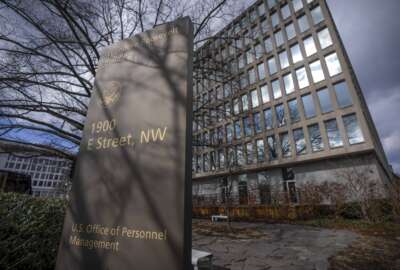Obama SES reform plan makes problem worse, not better
President Barack Obama addressed members of the Senior Executive Service today intending to raise their morale. In Depth host Francis Rose says the President's...
President Barack Obama’s remarks to the Senior Executive Service today were intended to be a step toward reversing the declining morale of the Senior Executive Service. But he may have made things worse. 
- The President spoke as though his administration invented the importance of recognizing federal employee excellence. “We’re creating an award to recognize outstanding service,” he said. “I’m surprised this hasn’t been done before, but we’re going to start.”The President’s proposal for a new Customer Service Awards program is overdue, but SESers can be excused for being less than impressed by this effort; and the idea is far from a new concept to recognize those who go above and beyond. The government started recognizing excellence among Senior Executives even before there was a Senior Executive Service. The government presented the first Presidential Rank Awards in 1978; the Civil Service Reform Act that established the SES didn’t take effect until 1979.President Obama himself broke that award streak, though, when the White House canceled the awards in 2013. The Office of Personnel Management continued collecting nominations that year, and the awards were reestablished this year. But it still rings hollow for the President to now claim, as though it’s shiny and new, “We are going to honor the people who do this job best.”
- He’s recycling the original point of the Senior Executive Service to create something he calls “new.” The Office of Personnel Management says “Current and aspiring executives have the option to participate in mobility assignments.” That sounds remarkably similar to the concept behind Obama’s White House Leadership Development Program. “Talented civil servants are going to have a chance to rotate through different agencies on high-priority assignments,” the President said, “and then they’ll bring back their new expertise to their home agency.” Another program that already exists allows employees to go on detail to an agency outside their current ones, and return to their home agencies at the end of that detail.
- He’s content to examine the SES problem for the last two years of the administration instead of doing something about it. “We’re creating a White House Advisory Group on Senior Executive Service reform,” the President said. “It’s going to include leaders from large and small agencies, as well as rising leaders — we want to hear from them too.” Will this group examine this research from 2009? Or this proposal for SES reform from September 2012? Or this book from 2013? Or the newest one, just released two weeks ago? Or any of the others that have come down the road since 1979? The work on needed-reforms for the SES has already been done. There is remarkably little disagreement and much consensus. But President Obama missed an opportunity to take action, instead of proposing another blue-ribbon panel to admire the problem instead of fix it.
Even the President’s famous delivery was off, as if he were almost annoyed to be giving the speech. His comments, at times, came close to scolding. On several occasions, he delivered advice these SESers already knew, with a tone that implied his were new ideas, never before discovered. He told the group, “If we’re not engaging in self-reflection, and try[ing] to figure out how every single day we can be doing our jobs a little bit better, then we’re failing the American people.” He’s right — and agencies across government are already doing it. Someone in the White House should brief him on how agencies are responding to recommendations to Government Accountability Office and agency Inspector General reports, or how his own political appointees have devised performance improvement plans that they depend on career civil servants to implement, or even how his own Office of Management and Budget is conducting Stat sessions to get off-track programs back on track. Not everything President Obama said was an insult to the federal workforce. He recognized the “extraordinary sacrifice” that some federal employees make. “You made a decision at some point in your life to serve your country; your country is stronger because of that decision,” he said. And he acknowledged that pay freezes (he proposed), the shutdown, and the current political climate against the federal government and its employees (driven by some conservative Republicans) create “tough circumstances” that employees are working under. The President took his textbook shots at Republicans and the media. “[The media] only report when something goes wrong, or when there’s a shutdown, and somebody notices, ‘Oh, we need that, and nobody’s doing it,'” he said. But when he hammers the media for “focus[ing] on the one thing that goes wrong, instead of the 99 things that go right” and tells the SES corps “that’s not going to change,” he’s only partially correct. Maybe The Washington Post won’t tell his administration’s success stories. Maybe The New York Times won’t, or the TV networks. But Federal News Radio and other media outlets that cover the business of the federal government agree — never before has an administration gone to such lengths to not cooperate with news outlets that want to highlight good management and success stories. Filling media liaison positions across the executive branch with political appointees, who assume the worst when the media calls, is a sure-fire recipe for a terrible public response to disasters like HealthCare.gov. When the “big boys” who don’t cover the government every day go looking for those success stories and find none, it becomes hard for them to tell a narrative other than “this is how the government always does things.” And that blackens the black eye federal employees have even more. Finally, Mr. President, what took so long? Why did you wait nearly six full years to tell your career leaders they’re important? It fits the theme that even the President’s biggest fans hold, that the administration has been absent on management issues since it took office. Former Deputy Secretary of Labor Seth Harris gave a convincing presentation at the Management of Change conference in May 2014, in which he expressed his admiration of President Obama, and especially Vice President Biden. He then proceeded to explain how and why the White House had no management agenda in its first term, and how his agency adapted. When one of your biggest fans can’t see where you’re leading, you’ve got a big problem. The plan President Obama introduced today might have worked if he introduced it when he first came into office almost six years ago, fresh off his promise to “transform Washington” and “make government cool again.” But he’s introducing a plan that will take several years to execute, with only 25 months to make it happen. The odds are long that it will make any difference at all — and in that vacuum, the problem is likely to get worse, not better.
In Depth host Francis Rose interviews government executives and contractors about the latest news affecting the way federal employees do their jobs. In Depth airs Monday-Friday, 4-7 p.m. EST, on 1500AM in Washington, D.C. Listen live on FederalNewsRadio.com or find archived episodes here. RELATED STORIES: Obama announces series of SES reforms 2014 Best Places to Work list reflects feds’ sagging morale Former officials seek new course for SES
Copyright © 2024 Federal News Network. All rights reserved. This website is not intended for users located within the European Economic Area.





